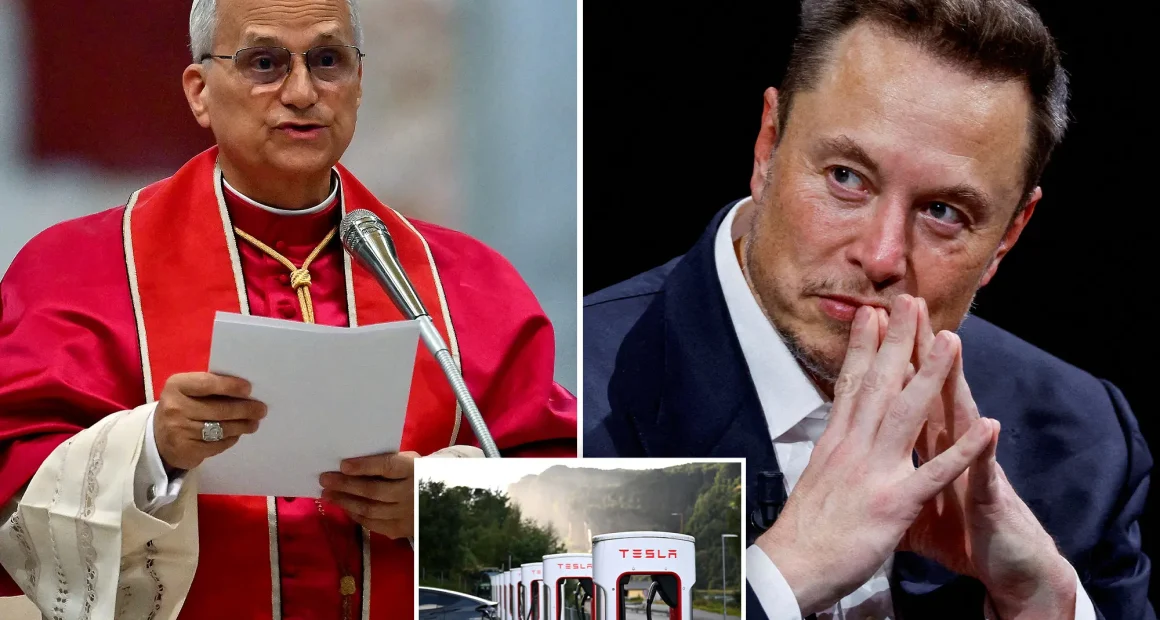Pope Leo XIV is openly critical of Tesla’s plan that could make CEO Elon Musk the world’s first trillionaire.
The newly appointed pontiff, the first American-born pope in history, told the Catholic news outlet Crux that Musk’s proposed compensation reflects a troubling erosion of “the value of human life, of the family, of the value of society.”
“Yesterday, the news came that Elon Musk is on track to become the first trillionaire in the world,” Leo—formerly Cardinal Robert Francis Prevost of Chicago—said in an interview with Crux published on Sunday.
“What does that mean, and what’s it all about?” the pope asked. “If that’s the only thing that still has any value, then we are in big trouble.”
Leo gave the interview to Crux in July—weeks before Tesla shareholders formally proposed a pay package that could reach $1 trillion if Musk meets certain company performance milestones.
A report published last year by Informa Connect Academy suggested Musk could reach a net worth of $1 trillion by 2027.
The pope said Musk’s potential compensation is just one example of “the continuously widening gap between the income of the working class and the wealth of the richest.”
“Sixty years ago, CEOs might have earned four to six times what their workers made. The last figure I saw shows it’s now 600 times,” Leo said in an interview for an upcoming Spanish-language biography to be published by Penguin Peru.
The Post has reached out to Tesla for comment.
Last week, Musk purchased roughly $1 billion worth of Tesla stock—his largest open-market buy since 2022—amid a board-backed pay plan that could award him stock worth up to $1 trillion.
According to a regulatory filing released Monday, Musk bought the shares on Friday through a revocable trust. Bloomberg News was the first to report the filing.
The purchase coincided with Tesla Chair Robyn Denholm defending the proposed compensation package, which links Musk’s potential payout to ambitious market-value and performance milestones.
Musk’s move sent Tesla shares surging, rising as much as 7.3% in premarket trading. The rebound marks a turnaround for the stock, which had fallen 45% earlier this year.
At 54, Musk last bought Tesla shares in February 2022, spending more than $20 billion—the same year he acquired Twitter.
His latest purchase signals continued confidence in Tesla despite a challenging first half of 2025, when global deliveries dropped 13%. Musk has also warned of “a few rough quarters” ahead as U.S. incentives for electric-vehicle buyers expire this month.
Musk remains the world’s richest person, with an estimated net worth of $419 billion.
Last week, Tesla Chair Robyn Denholm told Bloomberg News that only Musk has the vision to guide the automaker through its transition into artificial intelligence and robotics.
“He is a generational leader,” Denholm said Friday in a Bloomberg Television interview. “There aren’t any other people like Elon who can lead the company over the next decade or so.”
The board’s unprecedented compensation plan for Musk depends on Tesla achieving milestones such as delivering 20 million electric vehicles, deploying one million robotaxis, and increasing its market value beyond $7.5 trillion.
A shareholder vote on the proposal is scheduled for November.
Denholm noted that Musk could potentially take on a different role, such as chief product officer, but emphasized that the package is designed to keep him focused on Tesla’s push into AI and robotics.
Musk has indicated that up to 80% of Tesla’s long-term value could come from the Optimus humanoid robot, even as EV sales struggle in key markets.
Tesla charging stations have seen declining demand as global EV sales slump.
Despite this, Tesla shares rose 6.3% on Friday.
Musk has served as Tesla’s CEO since October 2008. The electric carmaker went public on the Nasdaq in June 2010, with shares priced at $17 each. As of Monday morning, the stock traded at $395.94—an increase of nearly 25,000%.
However, Tesla has faced challenges in recent months, with falling sales, shrinking profits, and Musk’s political ventures impacting the company’s brand.
Global EV deliveries are projected to decline for a second consecutive year, with sales down 13% and profits falling 16% in recent quarters.
Tesla’s operating margin has plummeted to just 2.1%, affected by lost U.S. tax credits, reduced regulatory credit sales, and price cuts of up to 15% on key models.
Competition from Chinese rival BYD has intensified, with the Shenzhen-based automaker surpassing Tesla in global sales and gaining market share in Europe and China.
Additionally, Tesla’s supply chain reliance on China has increased its exposure to tariffs and geopolitical risks.
Tesla Chair Robyn Denholm has defended the proposed compensation package.
Meanwhile, Musk has faced intense criticism for his political involvement.
He endorsed President Donald Trump in 2024, briefly led the Department of Government Efficiency under Trump, and has even hinted at forming his own political party.
These moves have alienated Tesla’s traditionally left-leaning customer base, sparking boycotts, protests, and vandalism at showrooms.
Investors remain concerned that Tesla’s bets on humanoid robots and robotaxis may not quickly make up for declining sales.










